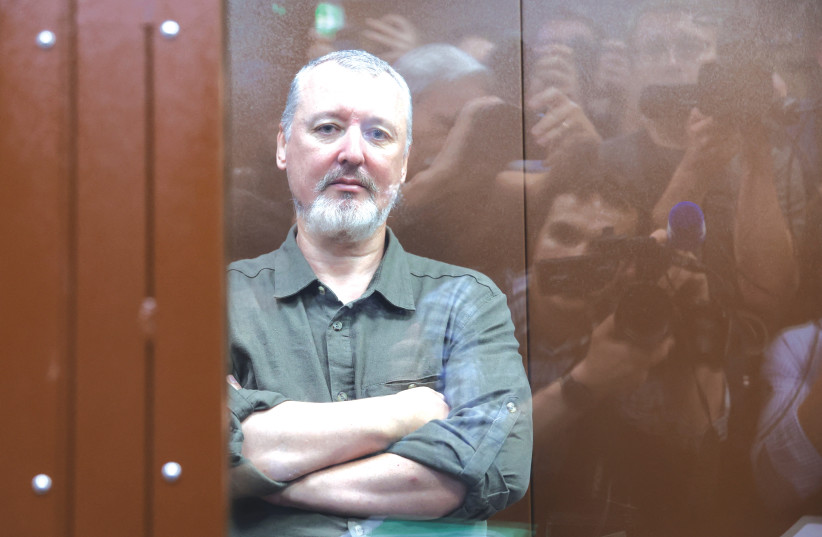Vladimir Putin’s regime shows growing signs of nervousness. His invasion of Ukraine, which he planned to conclude triumphantly in a matter of weeks and which he still calls a Special Military Operation, has dragged on for a year and a half and shows no sign of winding down.
It has damaged the Russian economy and made the country an international pariah. According to the official Ukrainian count, the number of Russian war dead is nearing a quarter of a million. And yet victory – even on a far more modest scale than Putin originally intended – appears impossible and the war may yet turn into a massive, humiliating defeat.
There is no organized anti-war movement in Russia. Those who were opposed to Putin’s aggression against Ukraine, or didn’t want to be drafted, have mostly left, going to Kazakhstan, Turkey, or Israel, and protests against the war have been sporadic and isolated, mostly involving brave individuals standing on the sidewalk with handwritten signs.
Yet, the government has an increasingly paranoid reaction even to such innocuous manifestations of dissent, imposing draconian sentences for “discrediting the military.” It is even persecuting the regime’s democratic opponents who are already in jail. Alexei Navalny, already convicted on a variety of trumped-up charges, is now facing another 20 years in a “special” labor camp for “extremism.”
While anti-war protests have been insignificant, attacks on the Kremlin from the Right have had more bite. Evgeny Prigozhin staged a strange coup last month, accusing the Defense Ministry of incompetence and corruption. It had a strange outcome, effectively resulting in a pardon for all involved, even though the rebels shot down a number of Russian military aircraft. It was as if Putin felt he needed to tread carefully with the Wagner Group, Prigozhin’s private army.
Instead, Putin arrested Igor Girkin, who has been long critical of his government for insufficient zeal in prosecuting the war.
THESE EVENTS show that the regime feels vulnerable from both the war and the peace camps, but its response to real or perceived challenges only heightens the impression of weakness.
Everyone knows that in Russia nothing ever changes – up until the moment when everything does. Worse, the increasingly shaky political situation in the world’s largest land mass and one of the two nuclear superpowers fits into the spreading crisis of governability that is affecting many parts of the world in the 21st century.

Putin's regime at risk
During the past two decades, several countries have become ungovernable, including Libya, Lebanon, Somalia, Haiti, and a few others. Several are barely governable, such as Syria, Venezuela, Honduras, Guatemala, El Salvador, and Iraq. Still others, like Peru, are revealing serious cracks in their governability.
Beyond that, there are nations run by personalized autocrats who will, sooner or later, depart the scene, possibly leaving behind a barren political landscape and hollowed-out institutions which would be highly susceptible to chaos.
Worse still, in stable, solid, traditional democracies, bitter political divisions are growing, and respect for authority is waning. While even in Britain and Israel such processes are underway, the most salient, and worrisome, is the situation in the leading nation of the Free World – the United States.
Conspiracy theories run rampant, political allegiances are held above recognized national interests and long-respected values, and a personality cult reminiscent of Guyana’s suicidal Jim Jones sect has taken hold. America has already witnessed the first coup attempt in its history, which is unlikely to be the last.
But Russia, despite apparent outward stability, may be much further along the path of chaos.
Political pundits and politicians in Europe and North America have expressed concern that a decisive Ukrainian victory on the battlefield could lead to Putin’s fall and spread anarchy in Russia, in which centralized control over some 5,000 Russian nuclear warheads could be lost.
It was one of the reasons why Western military aid to Ukraine has been a trickle, not a flow, and why the most advanced NATO weapon systems, including long-range rockets and fighter jets, are still withheld.
But the real risk is that the Putin regime could collapse even without a Ukrainian victory. The West – along with China, India, and other leading world powers – should stop worrying about the situation at the front and start figuring out how it could secure Russia’s nuclear arsenal in this contingency.
The writer, a New York-based economist, is a member of the US Andrei Sakharov Foundation. In 2005-2008, he organized a support group for the Hebrew Immigrant Aid Society, bringing together Jewish immigrants from the former Soviet Union who now live in the United States.
